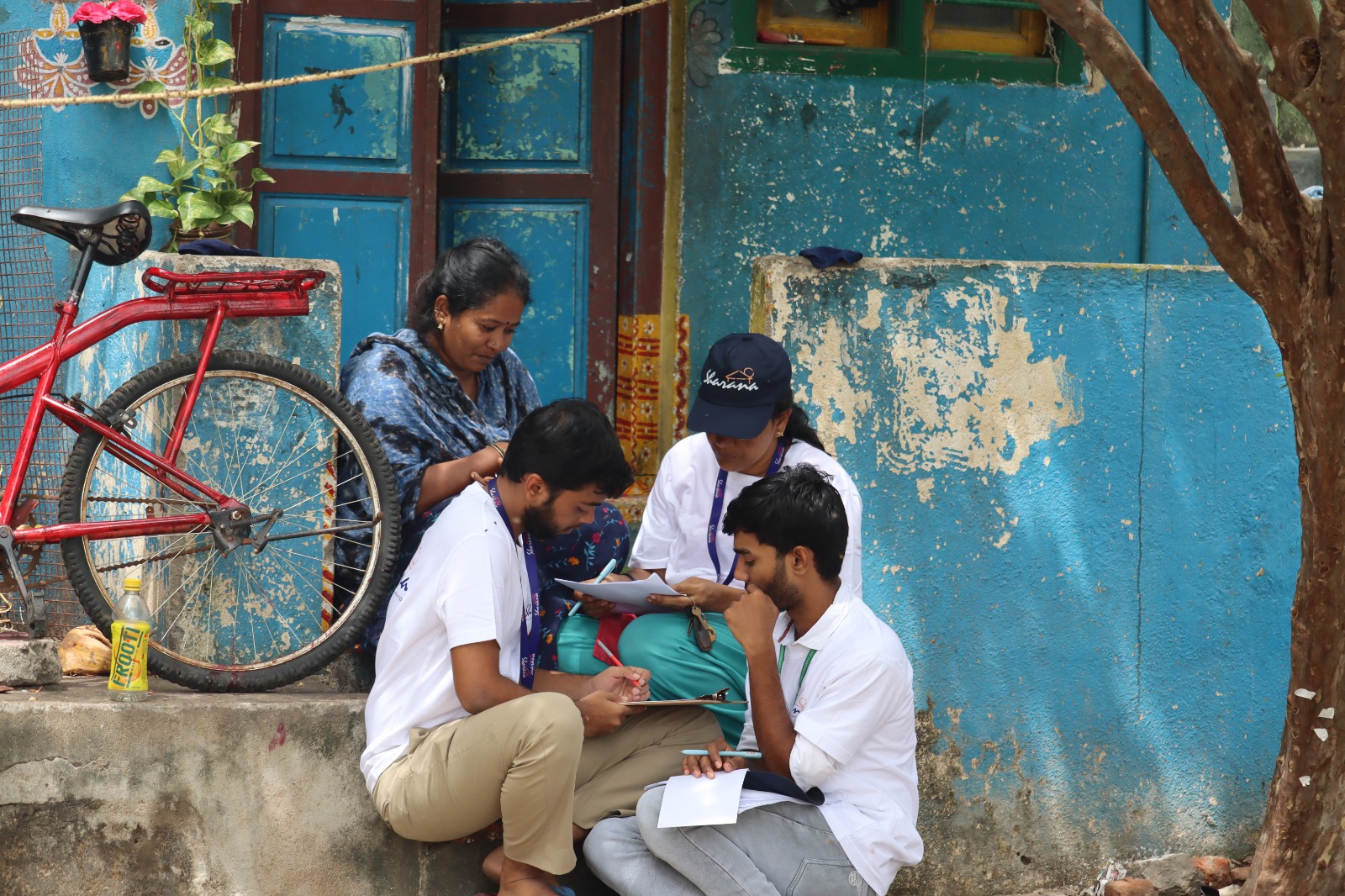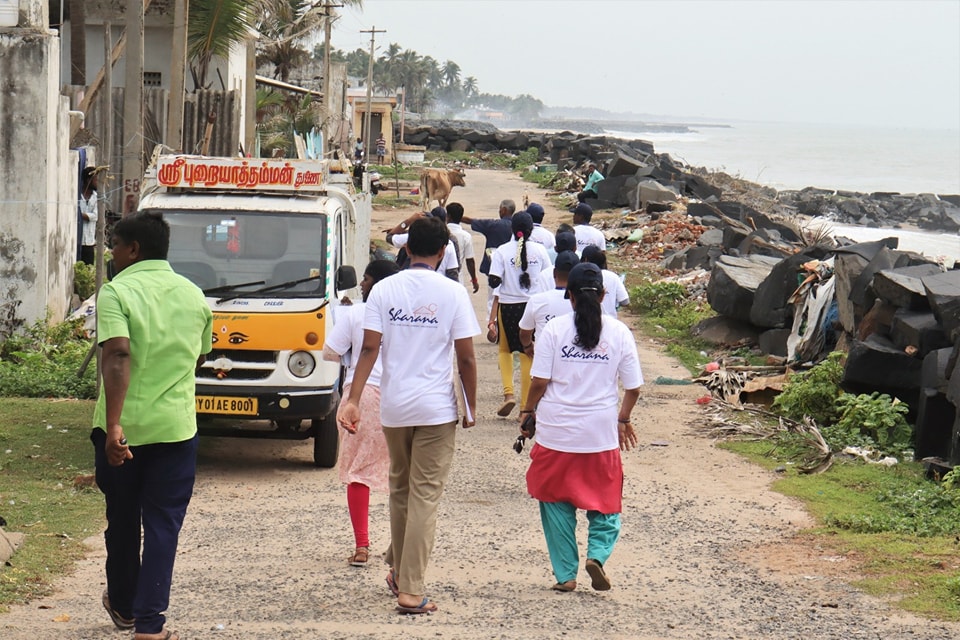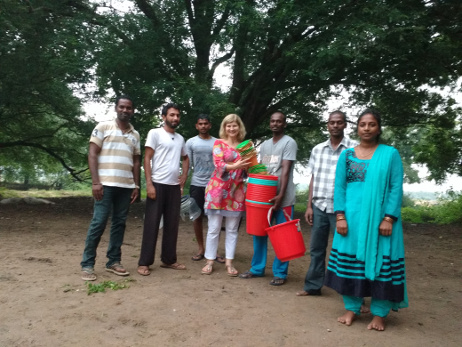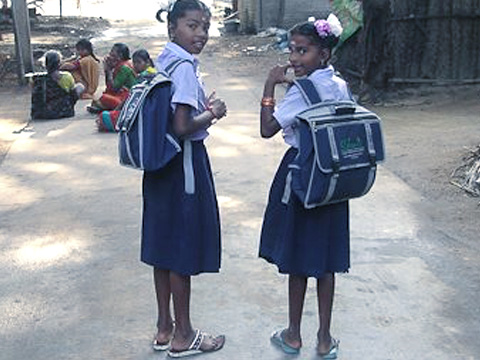Penned by various members of Team Sharana
 Earlier this year, our Founder Ms. Rajkala Partha as well as Board Member Ms. Alo Pal visited Sothanaikuppam. They engaged in meaningful discussions, explored ideas, and shared visions for a brighter future for the community. They had the opportunity to meet with the Panchayat Leaders of the area, identify the community’s needs and how we can help.
Earlier this year, our Founder Ms. Rajkala Partha as well as Board Member Ms. Alo Pal visited Sothanaikuppam. They engaged in meaningful discussions, explored ideas, and shared visions for a brighter future for the community. They had the opportunity to meet with the Panchayat Leaders of the area, identify the community’s needs and how we can help.
Following this, in July, our dedicated Program Managers, Social Workers and Interns hit the field, going door-to-door conducting a survey and connecting with every household. Their mission was to listen, to understand, and to ensure that the interventions we plan to bring align perfectly with the needs and dreams of the people we serve. The information collected during these visits will pave the way for targeted initiatives that empower the community and amplify their strengths. Consultation with local voices has always been integral to our interventions in the field.

About the Village & Survey Findings
The name Sothanaikuppam has an interesting meaning, Sothanai means ‘checking’ and Kuppam means ‘a group of people living in a particular community’.
The survey findings showed that the majority of the residents are fishermen. Men are fishing coolies or labourers and use small fibre boats to go fishing in the sea and the women sell fish in the local market to support their households.
 Before the 1990s, fishing was difficult and not very safe. There were different ways of fishing with various types of traditional boats like Kattumaram, Paaivalai, Chinnavalai and Periyavalai (small and big fishing nets), with Marapadagu (Wooden Boat) and Surukkuvalai (Shrink Web), Thuduppu (oars). Back then a group of around 25-30 people would go fishing in the sea and divide the income, and the person who had invested the maximum amount in the purchase of the materials would take the highest percentage of the sales. The coolies or labourers would be only paid for the labour cost. With the advancement of technology and the use of more sophisticated equipment, it is no longer necessary for such a large group to go fishing at sea.
Before the 1990s, fishing was difficult and not very safe. There were different ways of fishing with various types of traditional boats like Kattumaram, Paaivalai, Chinnavalai and Periyavalai (small and big fishing nets), with Marapadagu (Wooden Boat) and Surukkuvalai (Shrink Web), Thuduppu (oars). Back then a group of around 25-30 people would go fishing in the sea and divide the income, and the person who had invested the maximum amount in the purchase of the materials would take the highest percentage of the sales. The coolies or labourers would be only paid for the labour cost. With the advancement of technology and the use of more sophisticated equipment, it is no longer necessary for such a large group to go fishing at sea.
At present, almost 70 percent of the residents are involved in fishing while the remaining 30 percent are involved in other professions. All the children are studying and also pursuing higher education, looking to apply for jobs outside of the community. Majority of the new generation does not want to continue fishing as it is not a stable source of income; work is primarily during the fishing season and in the event of any natural calamity, income entirely stops.
Post the devastation of the Tsunami in 2004, the village was severely affected. The houses and fibre boats were damaged. At that time, the Government of Tamil Nadu Fisheries Department worked with NGOs in the area and helped construct the bunds’ sea side with large rocks, provided new fibre boats and constructed houses. Sharana and few other NGOs adopted the village and provided food, provisions and even new fibre boats. Special focus was given on children’s education and women empowerment. Sharana constructed a building for the children to study, which was initially used for evening homework help centre but is currently not in use.
The Village Panchayath and community members asked us to renovate the community hall building and continue the evening homework help centre. Sharana plans to scope and provide developmental activities focusing on women and children.
 Conducting this survey in Sothanaikuppam was an indispensable step in our commitment to making a positive and lasting impact on all the communities we serve. Through data-driven insights, and a community-oriented approach, we can tailor our interventions effectively, empowering the village residents to lead a better quality of life. The survey aligns with our values of transparency, accountability, and community participation, ensuring that our interventions remain relevant, impactful, and sustainable in the long run.
Conducting this survey in Sothanaikuppam was an indispensable step in our commitment to making a positive and lasting impact on all the communities we serve. Through data-driven insights, and a community-oriented approach, we can tailor our interventions effectively, empowering the village residents to lead a better quality of life. The survey aligns with our values of transparency, accountability, and community participation, ensuring that our interventions remain relevant, impactful, and sustainable in the long run.












